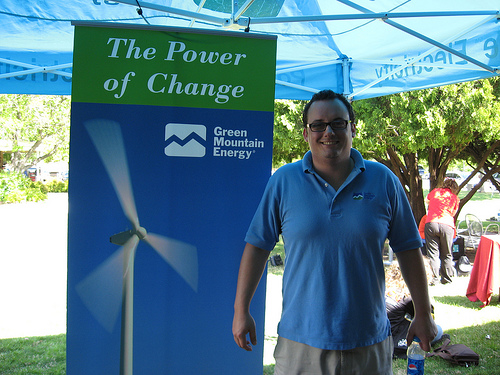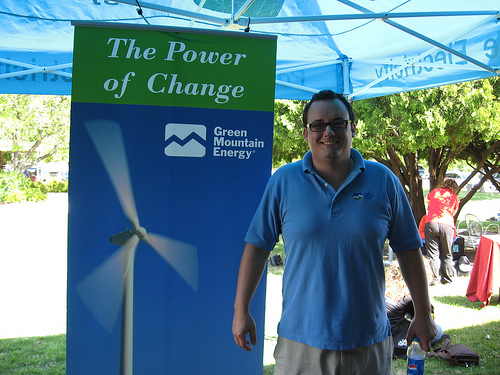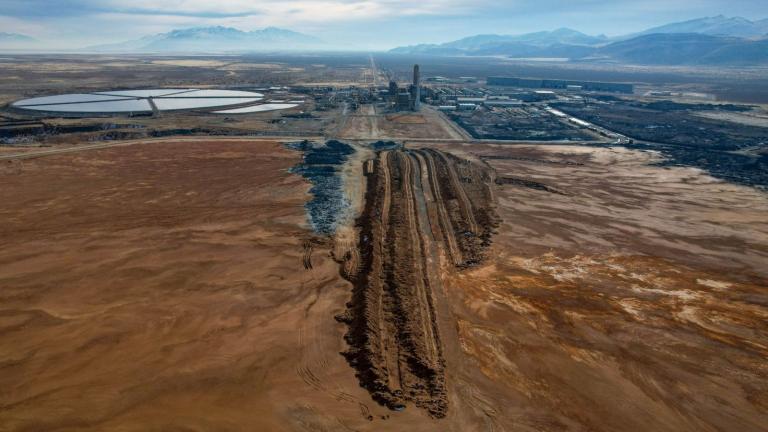 As environmentally laudable as Green Mountain’s products may be, there is a side to the business that is absent from the sales pitch.Photo: Tony CecalaLike many New Yorkers, Adam Holland first encountered Green Mountain Energy while shopping for groceries. It was June, and Holland was walking into the Park Slope Food Co-op, in Brooklyn, when a young man with a clipboard stopped him touting the company’s service. Green Mountain Energy could offer Holland’s family electricity from cleaner sources than Con Edison, Holland recalls the man saying, and they wouldn’t even have to change the way they paid their bills. He had a brochure, with a picture of a windmill on it.
As environmentally laudable as Green Mountain’s products may be, there is a side to the business that is absent from the sales pitch.Photo: Tony CecalaLike many New Yorkers, Adam Holland first encountered Green Mountain Energy while shopping for groceries. It was June, and Holland was walking into the Park Slope Food Co-op, in Brooklyn, when a young man with a clipboard stopped him touting the company’s service. Green Mountain Energy could offer Holland’s family electricity from cleaner sources than Con Edison, Holland recalls the man saying, and they wouldn’t even have to change the way they paid their bills. He had a brochure, with a picture of a windmill on it.
Holland, who later recounted the episode on his blog, needed time to think it all over. When he got home and started Googling, he discovered something interesting: One of Green Mountain’s major shareholders at the time was BP, which had bought an 18.5 percent share of the company a decade earlier. Finding that out, at a time when the oil spill at one of BP’s wells in the Gulf of Mexico was in its third month, was enough to keep him away from Green Mountain, he said.
“They’re associated with the industry that I was hoping to avoid doing business with,” he said, referring to the oil industry. For people, like himself, who would consider Green Mountain’s service, he added, “I think that most of those people aren’t buying BP gas, avoid BP stock, and would avoid doing business with BP at any opportunity.”
Holland never did sign up with Green Mountain Energy. But since the company entered New York’s deregulated energy market in August 2009, thousands of people have. Green Mountain, which does not disclose detailed subscriber numbers, says that just under 10,000 of its 300,000 nationwide customers are in New York City. Its growth plans in the region are ambitious, with goals of 50,000 customers in the city alone by 2012, and 100,000 by the end of 2015.
The company targets environmentally conscious consumers, setting up shop at farmer’s markets, street fairs and concerts, approaching building-management companies, and standing outside green-friendly businesses, like Mr. Holland’s food co-op. But as environmentally laudable as Green Mountain’s products may be, there is a side to the business that is absent from the sales pitch: Green Mountain has long had corporate ties to the fossil fuel industry, and those ties have only gotten closer. Some potential customers will not mind, reasoning that the company will be a good influence on its polluting siblings. But as of this month, those who are uncomfortable about their money ultimately going to a diversified utility conglomerate have a lot more to worry about.
In September, BP and the rest of Green Mountain Energy’s owners sold their stakes in the company to NRG Energy, one of the country’s largest power plant operators, for $350 million. The deal became final on Nov. 5. In joining NRG, Green Mountain becomes part of a company that derives the vast majority of its electricity — and its income — from fossil fuels.
As of Sept. 15, natural gas, coal and oil accounted for 22,820 megawatts of NRG’s power generation — about 93 percent. Wind and solar power, meanwhile, represented just under two percent of the company’s power generation. Moreover, in 2009, NRG plants around the world produced 59 million tons of carbon dioxide, a greenhouse gas. About 8 million tons of that total were emitted in East Coast states, including New York, according to NRG’s 2009 annual report.
The absorption of a small and specialized company by a large and diverse one is not unusual in the power industry, and it illustrates the reasons why small green-energy companies may partner with larger entities — to ensure their long-term survival.
And the service Green Mountain offers will not change under NRG: For every watt of energy that customers use, Green Mountain buys an equal amount of power from wind and hydroelectric plants. (Directing power from specific generating plants to specific customers on the local grid, the company emphasizes, is impossible.) The power that Green Mountain buys, spokeswoman Marci Grossman said, will come both from NRG’s plants and from independent water and wind plants with which the company already has long-term contracts.
The biggest change — from the perspective of the environmentally conscious — seems to be that, as of the acquisition, all of Green Mountain’s profits now belong to NRG. That company, of course, can invest them in whichever technology it wants, regardless of environmental impact.
“If a consumer is looking for a company that is conclusively green, obviously NRG is not that,” said Mindy Spatt, a spokeswoman for the Utility Reform Network, a California-based ratepayer advocacy group.
Paul Markovich, Green Mountain’s president of residential services, cast the sale as a development that could eventually make NRG a more environmentally friendly company, citing Green Mountain’s obligation to match its subscribers’ power usage with sustainable generation. He emphasized NRG’s substantial holdings in sustainable energy: Its facilities have the capacity to generate 445 megawatts of wind power, making it one of the largest wind energy providers in the country, and it has made several recent high-profile moves toward investing in solar power.
“Our objective stays the same: to support cleaner, less polluting energy,” he said. “To the extent that we’re successful in what we do, we will force NRG to create more renewable resources.” Should the demand for those resources exceed NRG’s capability to generate it, Markovich added, “either they’d have to build more, or we’d have to buy it from somebody else.”
John Rogers, a senior energy analyst at the Union of Concerned Scientists, an environmental group, called this a valid strategy, and one that has been a key driver for the construction of new renewable energy generators like wind farms. Rogers said his organization does not discuss specific deals and companies, but he said that energy customers, in general, should not doubt the effectiveness of purchasing clean power.
“Part of what you’re doing is voting for our energy future with every kilowatt-hour of electricity you use, so you can also take that into account in deciding what horses you want to back,” Rogers said. “It is important to know that buying green power can make a real difference, has made a real difference.”
Meanwhile, NRG President David Crane has made clear that the larger company intends to shift toward more environmentally friendly fuel sources: His letter to shareholders, accompanying the 2009 annual report, focuses overwhelmingly on the theme of “moving clean energy forward.” Also clear, though, is that Crane defines the term broadly.
“I believe NRG is well-positioned to seize first-mover advantage and grow into the nation’s foremost provider of clean energy both as a primary and secondary energy source,” he wrote in the letter. That, he added, means “safe, affordable nuclear and clean coal power,” supported by wind, solar, and gas generation. Crane’s conception of clean energy, in other words, is far more inclusive than the way Green Mountain Energy has traditionally defined its “pollution-free” product, which relies solely on wind and water power.
The colorful history of Green Mountain’s ownership, though, stretches far back beyond NRG and BP. The company was founded in 1997 by Green Mountain Power, a Vermont utility, and Sam Wyly, a brash Texas billionaire who described himself to The New York Times as “a monomaniac with one goal: clean air from clean energy.”
Within three years, the company found itself in i
ts first skirmish with environmental activists, when Wyly — who was also a friend and major campaign contributor to George W. Bush — spent $2.5 million on ads praising then-Governor Bush’s environmental record. That year — 2000 — the Environmental Working Group called for a boycott of the company (The boycott was later withdrawn and an Environmental Working Group spokesman said the organization no longer has a position on Green Mountain.).
Wyly and his family eventually invested $100 million in Green Mountain over the years, though their stake in the company — including son Evan Wyly’s seat on the company’s board — came to an end with the NRG purchase.
The company, meanwhile, moved from Vermont to Austin, Texas just after the 2000 investment from BP — though it kept its name, which by then had evolved to GreenMountain.com.
“There are plenty of companies whose names do not reflect their geographic location,” then-spokesman Kevin Ellis told the Vermont paper Seven Days. “Patagonia, for example.”
The .com in the company’s name fell away later, with the demise of the internet boom. And while NRG’s corporate headquarters are relatively closer to the Green Mountain State — in Princeton, New Jersey — the company’s plan is to keep Green Mountain headquartered in Texas.
Most of Green Mountain’s leadership will also remain in place, Grossman said, and that includes Markovich and company CEO Paul Thomas, both former BP executives who joined the company around the time of BP’s buy-in.
The deal, analysts say, has benefits for both sides: Green Mountain, which has always been a marketer of electricity rather than a producer, now has access to NRG’s clean-power generation plants. NRG, which plans to maintain Green Mountain as a wholly owned stand-alone company, further diversifies its portfolio and creates a dedicated marketing arm for the sustainable power it generates.
Jamie Van Nostrand, executive director of the Pace Energy and Climate Center, said Green Mountain’s expertise in negotiating complex green-energy markets should help its new parent company. Furthermore, NRG will be gaining not just Green Mountain’s existing customers, who are willing to spend a bit extra for clean energy, but also Green Mountain’s marketing team, which has experience in reaching out to such people.
Whether those customers should feel uncomfortable about the new alliances is a complex and personal matter. Some, Van Nostrand acknowledged, may regret the passing of Green Mountain’s days as an independent entity.
“It’s kind of a philosophical thing, I guess,” he said. “There’s something attractive about that, to know that if this company is successful, it’s these four or five guys who started it who are going to reap the benefits.”
On the other hand, Green Mountain will still have to deliver on the product it sells, no matter who owns it. Customers unhappy with the provider’s corporate alliances can always seek out some smaller entity to sell them power, Van Nostrand said. But, he added, large corporate ownership has some advantages to customers.
“You’re not taking a greater risk on some company that’s going to be gone six months from now,” he said. “It’s got NRG behind it.”
This article was republished with permission from City Limits, a New York-based civic news organization.




